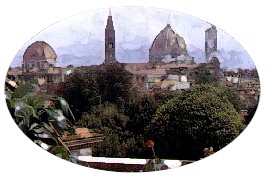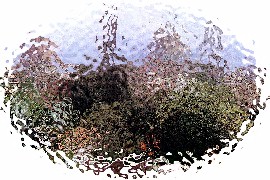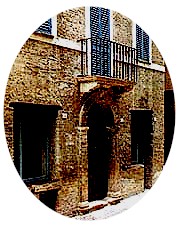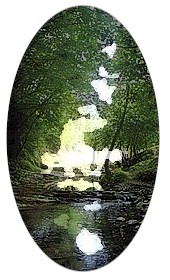| It’s
autumn -- hunting
season in the Indian summer woods back home, a
time of year that always fills me with what the
Greeks call pothos. I’m walking through
Florence, and as I wander the maze of streets
between the cathedral and the old stone bridge
over the Arno, I’m thinking about this
pothos, this yearning for the unattainable, the
ideal, the beyond. Always beyond -- Plato defines
pothos by saying it’s the desire for
what’s absent, what’s somewhere else. From the hills above the city at late
afternoon on cloudless days, the cathedral
appears to be rising up from the floor of the
valley carved by the river, ready to float with
its glowing dome up through the fine light and
melt into the far reaches of the sky. Here, down
below, the light is a mist so thick you can run
it through your fingers like silk, rub your cheek
against it the way cats napping on windowsills
do.
So, too, with pothos. From the
heights of his dialogue with Cratylus and
Hermogenes, Plato can speak of it quite breezily
as a kind of nostalgia for the non-existent. But
down here in this thick Tuscan light, the absent
is very present. It makes us restless, and
wanderers, for as soon as we reach the somewhere
else, whatever it might be that we’re
longing for has moved on to a new somewhere else.
Casanova probably had a bad case of pothos.
Alexander the Great certainly did.
The light slips down the sides
of the old stone bridges where jewelers and
goldsmiths hawk their wares. It moves with the
fluid grace of a slender young woman slipping
into a lake to refresh herself with a swim. On
vases and in statuary, pothos is depicted as a
youth radiant with the first flush of manhood.
I’m not so sure an athletic young woman
wouldn’t be closer to the truth.

Some
years ago I had a
roommate. She and her boyfriend shared a flat
with me in San Francisco, and one afternoon when
we locked ourselves out of the flat, she slipped
down from the roof, three stories above the
street, and glided through an open window to let
us in. Easily, without hesitation, as though
hanging by your fingernails from a rain gutter
many feet above the traffic and swinging your
body through the air were no more dangerous than
stepping off a curb. I remember the fierce, proud
look she tossed me and her boyfriend as she
opened the front door for us.
And how I once stumbled upon
her naked. It was after a shower, the large red
towel she’d used to dry herself heaped at
her feet. She was shaking the water out of her
hair by tossing her head from side to side, her
eyes closed, an expression of the deepest
pleasure on her face. Her whole body, every
muscle, every inch of smooth, flawless skin,
glowed with the pleasure of being alive, a young
and strong animal. Though I’ve heard from
her old boyfriend that she’s had a child and
grown chunkier, in my mind she’s still
lithe, still moves with the quickness and
sureness of a fox sprinting through the woods on
a bright carpet of newly fallen leaves.
It was just a glimpse. I
hurried on past her room and down the long
hallway of the flat. Even though my vision of her
nakedness was an accident, and I didn’t
linger, I nevertheless felt as though I’d
witnessed something forbidden, much like Actaeon
that morning he chanced upon Artemis bathing in
her forest pool. I was disturbed. Not so much by
seeing her naked body -- neither of us were
prudes, or bashful -- as by seeing her naked
pleasure.
Later, after we’d moved to
different corners of the globe, I mailed her a
letter in which I confessed how uneasy I’d
felt at my glimpse of her unabashed, untarnished
-- unsullied, I believe is the word I chose --
pleasure in the curves and ripples of her naked
body. Rarely, I wrote, have I seen a body more
lovely, cast in a mold the old gods must’ve
buried for safekeeping when Christian martyrs at
war with the flesh sent them packing, a classic
mold painters discovered among the ruins of the
ancient world during the Renaissance right here
in Italy.
Mmm, she wrote back, how
sweet to be pelted with perfumed roses. My lips
nibble their petals, the soft tickle of them sets
my thighs purring.

The
light slips down
the bridge into the river. It shrinks at the
first touch of cool water on its toes, then goes
in deeper, up to its ankles and calves, above its
knees. As it glides noiselessly into the current,
the light dissolves, passing its glow on to the
river. The jewelry shops along the bridge are
closed because it’s siesta, the city quiet.
It’s that time of day when the shy and
subtle colors of twilight come out to play on the
deserted streets, clutching each object, each
window, door, balcony, railing, as though it were
home base in a game of hide-and-seek.
The atmosphere in this city of
painters is a painter’s dream at this
moment. It’s so solid, it seems your fingers
could snatch ribbons of color out of the air to
tie in your hair. It catches me by surprise. And
then I pass a woman standing in a doorway, an
olive light the tint of a gathering storm in her
eyes. We exchange glances. Hers undresses me and
invites me inside.
Women -- especially blondes --
visiting Italy often complain about how Italian
men pester them. I’m sure they do, but if
the women weren’t so busy primping their
hair or walking briskly away, annoyed or
flattered by the attention lavished upon them,
they might be able to learn something from
studying Italian women. In the country of Dante
and Verdi, a woman can make a mockery of a
man’s unwanted advances with a mere curl of
the lips. By the same token, a flick of the
eyebrows is enough to let him know what worlds of
delight and wonder lie waiting to be explored
beneath the weave of a cotton shift. Pelt me
with roses, they can say, just by cocking
their hips a certain way, come sing under my
moonlit window with your guitar.
Somewhere I read that when the
Mongols invaded Japan, they figured the little
guys who came down to the beach to do battle with
them were going to be pushovers. But when the
Japanese attacked without hesitation, flung
themselves into the swordplay without the usual
defensive maneuvers designed to preserve life and
limb, the Mongols were freaked out. They’d
never encountered adversaries so fearless, who
fought with such recklessness, without shield,
without bothering to parry thrusts. The Mongols,
confused and terrified by the samurai tactics,
scurried back to their ships and never returned.
Italian women understand the
art of samurai warfare instinctively. It may seem
strange to talk about love and war in the same
breath, but all’s fair in both, and
there’s a reason why Aphrodite is paired
with Ares. The women understand samurai tactics
and are not afraid to use them in campaigns of
the heart. If the Mongols had met Italian women
on the beach, they would’ve gone home broke,
naked, and bone-weary, but no doubt much happier.
In any event, one glance and my
clothes vaporize. My legs forget how it is you
put one foot in front of the other to move
forward. But I do, dizzy as I am, manage to
stagger down the street, my skin tingling as
though brushed by feathers, as though the
eyebrows of the unknown woman in the doorway were
bows that launched arrows laced together from
those downy feathers that fill the softest
pillows.

Unknown, and yet somehow familiar, I’d
felt those olive eyes caress me and ask me in
before. But where and when, and who, and how?
I’m like a cub reporter on his first
assignment, reciting the litany of routine
questions learned in journalism school.
By the time I reach the corner
of the street, I’ve stopped moving forward.
I’m having trouble simply standing up.
I saw a man get shot once
downtown at noon. Even before his body hit the
sidewalk, I knew he was dead, his soul gone
somewhere else. His face was white as shaving
cream. Blown away -- the aptness of the
expression struck me, so quickly did his soul
squirt out of his body, without a sound,
invisible.
Perhaps the reverse is also
true, and a homeless, wandering soul can enter a
body just as quickly and stealthily. It sneaks in
and shares your body with you, the way a parasite
does. It brings along a million memories of some
other life in some other place. They curl up in
your cells, each one like a caterpillar curled up
in a chrysalis. And those memories are what
creates pothos, the ache to unite the wandering
soul with the time and place in the cosmos when
the memories were made. Some event in the here
and now triggers their release, and all at once
some deep, unseen part of you remembers that
other life some other soul lived --
automatically, like music from a harp left in a
courtyard, its strings stroked by a sudden
breeze. Though you don’t actually see them,
you can nevertheless sense them, feel them
aflutter inside you.
Or it could be the unknown
woman and I were great lovers in a past life. Our
souls might’ve been linked together by a
long romance. They would recognize each other
instantly, and cry out for each other. This may
be how love at first sight happens. Could be I
was a fisherman back then, and she a gypsy
trapeze artist who ran away from the circus to
help me mend nets and bring my boat good luck
with her charms and spells. And at night, as I
was sailing back towards the land across the dark
sea, she would sing to me from the shore, guiding
me with a song through the rolling swells home to
her arms.
If souls travel not only from
human body to human body, but also come to reside
in animals and things, the connection between us
could go back much farther, into the earth
itself, to that spring when we were poppies,
blood-red poppies that crack a path through
stone. Perhaps our roots touched in a fissure of
the stone in the long ago. And the sun in the
long ago tickled our closed petals open into
little chalices to hold the sighs of Artemis and
Actaeon in another tale -- rarely told -- of what
really happened the morning the huntsman chanced
upon the goddess bathing in the pool, her clothes
and bow and quiver lying on the grassy bank.

At the
corner, I gather
myself together, turn around and retrace my
steps. I can’t let this moment pass. Every
moment in my life has added up to this moment, to
a glance from a woman in a doorway in Florence.
The woman is gone, the door
closed. Locked. I tap on it lightly, so the
neighbors won’t hear. Italian women may be
bold, but only within the rules of an elaborate
game of chastity and fidelity. The game itself
adds to the savor -- stolen kisses can be so
sweet, sin such a heady spice to spread on the
sheets.
Nothing happens, so I knock
louder. I’m nervous, expecting windows to
fly open any minute now, and gossips with wagging
tongues to stick their heads out to see
what’s happening out there in the shadows,
disturbing their siesta.
Am I out of my mind, banging on
the door of an unknown woman because of a passing
glance? Because of these swarms of newly-hatched
butterflies beating their wings against the
inside of my chest? And what if she’s
married, and her husband answers the door?
So sorry, signor, mi dispiace
to disturb your peace. But your wife and I, we
were great lovers in another life, you see, or
maybe just a couple flowers -- che bellisima, non
e vero? -- and I’m kind of nel mezzo del
cammin and I got this pothos -- you know? -- and
I thought, long as I’m in the neighborhood,
why not stop by and say a buon giorno or a ciao
for old time’s sake?
No husband comes to the door.
Nobody comes. My nerve is failing me. I’m
tempted to leave well enough alone and quietly
deposit my dreams of a tumble with the unknown
woman on her doorstep and walk away. But three,
as everyone knows from fairy tales, is a magic
number -- three witches, three fates, three
graces, three knocks.
The third time I pound on the
door. My hammering must be waking sleepy birds in
alpine forests, camels snoozing by a well in a
far-off oasis. It’s curious how utterly
still a large, bustling city can be in the light
that falls during the last hour of the day.
It’s as if the city were pausing to take the
breath that’ll carry it through the night.
The quiet is almost spooky, so complete just the
beating of my heart seems loud enough to bring
the neighbors to their windows.
The door opens a smidgeon. From
the slice of face and fine olive eye visible
through the narrow aperture, I know it’s
she. I step forward, ready to slip into the
hallway soon as she’s had an opportunity to
see it’s me and takes the chain off the
latch to swing the door open.

You,
she hisses at
me as I move closer, you had your chance. Now
beat it!!
And the door slams in my face.
The spots in front of my eyes
must be all those butterflies fluttering out of
me into the air and dying in mid-flight, their
bright corpses dropping to the pavement in the
falling dusk.
Beat it. She’s
right. Artemis was right. Actaeon hesitated --
that was his mistake. I don’t know why he
hesitated. Maybe he was stunned by her beauty.
Maybe he, like me, was thinking about some other
woman when he happened across the goddess in her
pool -- a shepherdess with the tender leaves of
spring in her voice, a lithe village lass shaking
water out of her hair. But the moment is only a
moment, which is what gives it such incredible
beauty and ferocity. Actaeon missed it and
Artemis changed him into a stag. For all of time
the hunter is condemned to repeat that moment
when his skin begins to thicken and sprout the
coarse hairs of a deer, and his hunting dogs,
sinking their fangs into his toughening hide,
begin to draw blood.
Of course, there’s
another, happier version of the tale. But that
one’s in another place, out of reach, lit by
the rays of a long-ago sun. And we, we go on
wandering a greeny ball of whirlydust with our
hunting dogs -- the hounds of desire -- baying
beside us, with this pothos locked away inside
us, wandering, forever looking for that other
place where a kiss on the eyelids changes the
color of the eyes, looking for that dent in the
grass, the bruised poppies on the bank beside the
pool the hunter and the mistress of wild things
crushed in their sighing embrace in the version
of the tale which so rarely gets told.

|